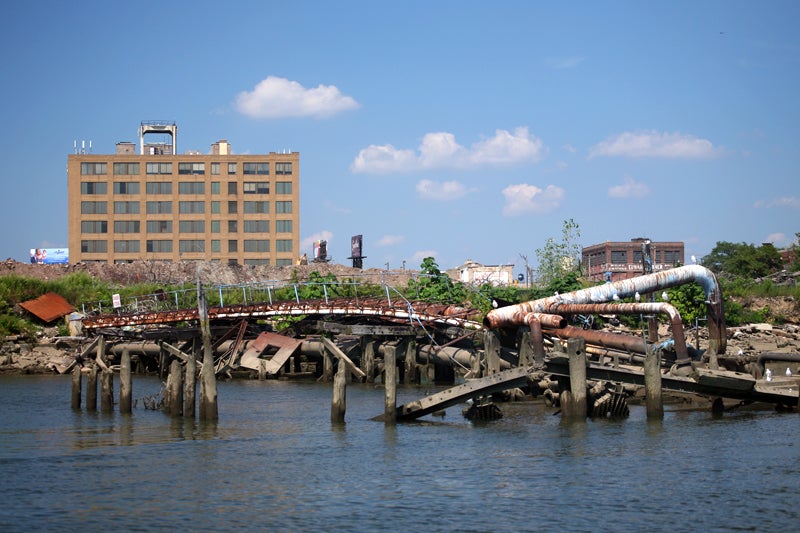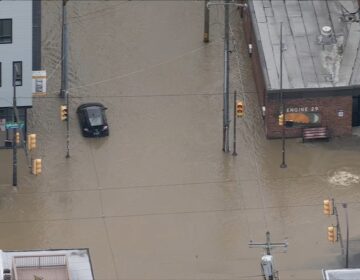SugarHouse sewer permit appealed

By Kellie Patrick Gates
For PlanPhilly
A Philadelphia neighborhood association and an environmental advocate for the Delaware River have asked the state’s Environmental Hearing Board to overturn a SugarHouse Casino sewer permit.
The permit was issued to the City by the Department of Environmental Protection in last month. SugarHouse is the beneficiary of the permit, however, because it allows the casino developer to enlarge the combined sewer outflow on its site and to hook its sanitary sewer system to the city’s waste treatment infrastructure. The outflow is the means by which both runoff and untreated waste water are channeled into the river – and away from people’s homes and city streets – when heavy rains overwhelm the sewer system.
Without the permit, SugarHouse cannot build its proposed casino.
In the appeal filed late yesterday with the state’s Environmental Hearing Board, Delaware Riverkeeper Maya van Rossum, The Delaware Riverkeeper Network, Northern Liberties Neighbors Association, and former FNA president Herb Shallcross give two major reasons that they believe the permit was improperly issued, one environmental, one procedural.
— When the public comment period was open, the appeal says, some portions of the application were not complete, or were later changed. By the time the application was complete and finalized, the public’s chance to comment on it had ended.
The main procedural concern, said Riverkeeper Network staff attorney Elizabeth K. Brown, was a change in in the number of gallons of waste water that would go from the casino into the city’s treatment system. The number decreased, Brown said, but it is still important that the public respond to the right facts. Brown said there is also a key piece of information that is still missing: The city certified that it could handle the increased capacity related to the project, but did not provide evidence that it could do so.
“The public comment period is not just a gratuitous nod toward the public, it’s a very serious part of the process,” van Rossum said. At minimum, she said, the public comment period should be re-opened so that people can comment on the new and additional information.
— Philadelphia is already out of compliance with federal Environmental Protection Agency guidelines because of the amount of untreated sewage that goes into the Delaware River during heavy rains. No permit should be issued that would create more capacity for outflow into the river, van Rossum said. Instead, the underlying problems should be fixed so that untreated waste no longer flows into the river. “The government has not taken the right step to protect the public,” she said.
The combined sewer outflow pipe is not in use under normal circumstances – only when a system overwhelmed by runoff needs relief. The problem currently, said SugarHouse spokeswoman Leigh Whitaker, is that the outflow pipe on the SugarHouse site is not large enough, so the relief system itself becomes overwhelmed during big storms, and that sends runoff and untreated sewage into residents’ homes.
The enlargement that the permit allows would create additional capacity and eliminate the back-up problem, she said.
Shallcross said he joined the action over frustration that the city is not fixing the sewer system so that it does not get overwhelmed and dump untreated waste into the river.
“The entire system needs upgraded,” he said. “At no point are they dealing with the underlying problems.”
Granting this permit means the city and state would have a hard time denying similar permits in the future. “Development of the river is going to take longer now do to the economic climate, but a great deal is planned,” he said.
“It is so very disappointing that Northern Liberties Neighbors Association and Herb Shallcross want sewer waste to continue to back up into their neighbors’ basements,” Whitaker said.
Whitaker referred questions related to the issues related to the public comment period to the DEP, since they run the process. DEP spokeswoman Deborah Fries said her department does not comment on pending legal matters.
A hearing has not yet been scheduled. According to the Environmental Hearing Board’s website, it usually takes at least 6 months from the day an appeal is filed until a hearing is held, and the Board usually handles all appeals within two years.
There are some circumstances in which a hearing is never held. The parties could reach a settlement before one is scheduled. Or, the Hearing Board could grant a motion to dismiss or a motion for summary judgment – a decision made based on applicable law and submitted evidence, but without a hearing.
In the meantime, Whitaker said, SugarHouse’s sewer module permit remains valid and in effect.
Adam H. Cutler of The Public Interest Law Center of Philadelphia is handling the case pro-bono on behalf of the NLNA and Shallcross.
A call for comment to the City Solicitor’s office was not returned Tuesday.
Contact the reporter at kelliespatrick@gmail.com
WHYY is your source for fact-based, in-depth journalism and information. As a nonprofit organization, we rely on financial support from readers like you. Please give today.




